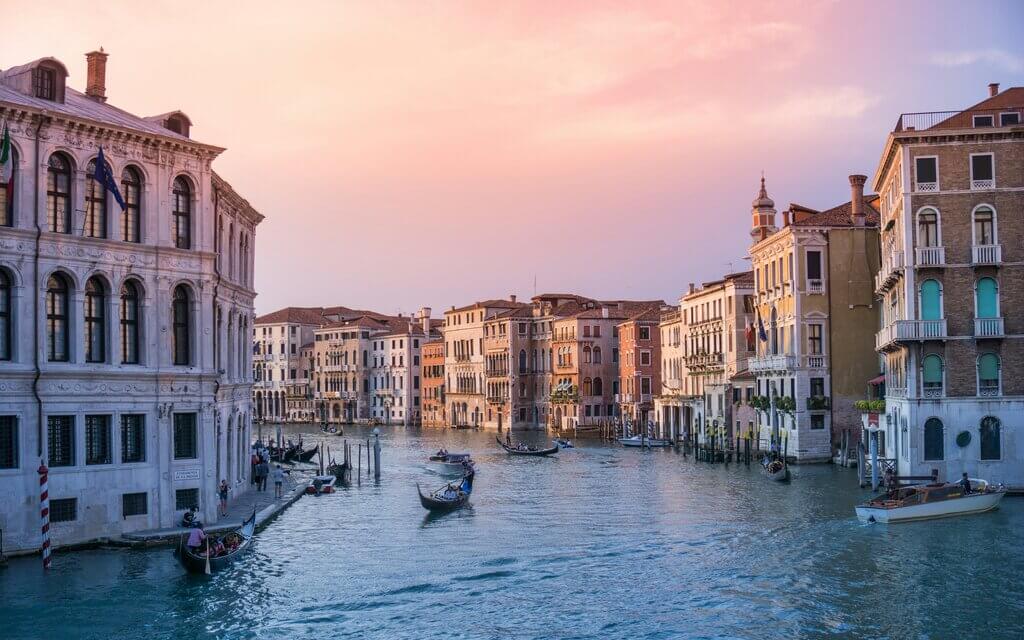Overview of the Italian real estate market
According to Statista, Italy’s real estate sector is poised for significant growth and is expected to hit €8.85 trillion ($9.62 trillion) by 2024. It is predominantly led by the residential market, which is forecasted to contribute €6.96 trillion ($7.57 trillion) to the total value in the same period. When purchasing property in Italy, the market is on course for consistent expansion, with an anticipated annual growth rate of 28%, potentially boosting its value to €8.95 trillion ($9.73 trillion) by 2028. For investors in Italy, this means significant investment opportunities and potential for high returns in the residential real estate market, with consistent and robust growth projected over the coming years.
Can foreigners buy property in Italy?
Foreigners can purchase property online or physically in Italy without the need for a residency visa or permit. They can buy property in Italy as the laws of the country permit it. Nevertheless, certain restrictions apply, specifically to those from “sensitive” countries or regions that do not reciprocate property ownership rights to Italians. These particular cases call for a detailed investigation on an individual basis to confirm legal adherence and to assess the buyer’s qualification for acquisition when buying property in Italy.
Best places in Italy to buy property
With its rich history, delicious cuisine, and breathtaking landscapes, locating the best places to buy property in Italy is a dream destination for many investors. Here are the five best places where to buy property in Italy:
- Lucca, Tuscany: Recognized for its magnificent Renaissance walls and cobblestone streets, Lucca offers a varied real estate market for buying property in Italy. Apartments starting at €50,000 ($54,650) are a great starting point for prospective purchasers who want to fully immerse themselves in Tuscan culture. The more expensive options are charming farmhouses with ancient charm tucked away among Italy’s famous rolling hills for about €200,000 ($218,600).
- Agrigento, Sicily: Agrigento’s real estate market presents good investment opportunities, and the town is well-known for the Valley of the Temples, a UNESCO World Heritage Site. Prices range from €16,000 ($17,488) to €100,000 ($109,300) when buying a villa in Italy for those who wish to experience Sicily’s rich history and Mediterranean way of life.
- Scalea, Calabria: Overlooking the Tyrrhenian Sea, Scalea caters to those seeking property in a scenic coastal town when buying property in Italy. The local housing market includes a range of affordable properties, such as modest fixer-uppers starting below €20,000 ($21,860) and comfortable family homes near €40,000 ($43,720), thus providing various real estate options against the backdrop of the captivating Italian coastline.
- Gessopalena, Abruzzo: Gessopalena, a village recognized for its ruins and views over the Abruzzo region, offers a sense of retreat and investment promise for buying property in Italy. The market includes homes ready for immediate living starting at €35,000 ($38,255) and reaching up to €100,000 ($109,300) when buying a villa in Italy.
- Fivizzano, Tuscany: Set between mountains and the Mediterranean, Fivizzano offers a tranquil atmosphere and a diversified property market. Apartments here start at €50,000 ($54,650), appealing to those seeking a modest lifestyle or holiday home. In contrast, larger, luxurious villas are available for up to €300,000 ($327,900), serving those desiring a more premium investment in Tuscany’s landscape.
How to buy property in Italy: Step-by-step process
Foreigners unfamiliar with the process may find it difficult to navigate the complexities of buying real estate in Italy. Here are six steps on how to buy property in Italy:
Step 1: Property hunt
Commence your search by pinpointing a residence that caters to your preferences and practical needs when buying land in Italy. Research through different online platforms, or take a scouting trip to your chosen areas. It is also important to seek out estate agents, especially when getting a mortgage in Italy as a foreigner. Understand the local environment, amenities on offer, and the overall community feel to ensure it’s the right fit for you.
Step 2: Present an offer
Upon selecting the property you like, proceed with presenting a purchase offer. At this stage, it’s wise to engage with a seasoned professional in Italy’s real estate agent to help you navigate this phase and present a compelling offer.
Step 3: Enter in a preliminary agreement
After they agree to your offer, the next phase involves drafting a preliminary contract, referred to as the compromesso. This contract, when purchasing property in Italy, establishes crucial particulars like price and conditions of purchase, securing the agreement between the seller and buyer.
Step 4: Make a deposit
Demonstrate your purchase intent and commitment by paying a deposit usually set at 10% to 20% of the property’s market price when buying land in Italy. This earnest money is a fundamental aspect of the purchasing process within Italian property law.
Step 5: Finalization of purchase
To fully seal the deal, the final deed of sale, or atto di compravendita, is signed off in front of a notary. This formal and conclusive step involves final legal verifications and the full property payment transfer, effectively granting you ownership rights.
Step 6: Taxes and additional costs
The final step when buying property in Italy is to address the mandatory property tax in Italy for foreigners and additional fees associated with your newly acquired property. These can fluctuate based on property type and transaction specifics.
The real cost of buying a house in Italy as a foreigner
Foreigners purchasing property in Italy need to be aware of several expenses beyond the purchase price that can substantially alter the total investment in a property. Below are the real costs of buying a house in Italy as a foreigner.
Upfront costs
Here are the primary initial costs involved when purchasing property in Italy:
- Property transfer taxes: Buying a primary residence incurs a 2% registration tax on the purchase price, which escalates to 7% for second or holiday homes.
- Mortgage tax: For those getting a mortgage in Italy as a foreigner, a 2-4% tax of the borrowed amount is applicable.
- Cadastral tax: This is charged at 1% of the property’s cadastral value, which is an assessed valuation for tax purposes distinct from its market price.
- Notary fees: Notary fees are vital for the legal validation of property transactions and range from 1-2% of the property’s purchase price.
- Legal fees: Securing legal assistance for the transaction might contribute an additional 1-2% to your overall costs.
- Agent commissions: The commission rates for real estate agents typically lie between 3-4%.
- Land registry fees: A compulsory fee, generally around €200 ($219), is required for the official registration of the property.
The final figure can increase to between 10% and 20% over the purchase price of the property when inspection, legal document translation, and other banking expenses are factored in. Even though each of these costs might not seem like much on its own, careful planning for money is required.

Recurring expenses
Following the purchase, there are also several annual costs to consider when buying property in Italy:
- Annual property taxes: The Imposta Municipale Unica (IMU) or the property tax in Italy for foreigners will vary depending on the specifics of your property, including type and locality.
- Utility bills: Standard charges for water, electricity, heating, and potentially service fees for communal residences.
- Garbage collection fee: Tassa sui rifiuti or TARI is a variable municipal tax for waste disposal services.
- Maintenance costs: Ongoing upkeep is essential to maintain the property’s value and aesthetic.
Investors interested in the real estate market should also be aware of the Capital Gains Tax applicable on the sale of non-primary residences within five years of the initial purchase.
Italian residency by buying property
Remember that owning property does not grant resident rights to the buyer in Italy, which is important to keep in mind while applying for Italian residency by buying property. Currently, buying property in Italy does not offer a visa that enables one to live permanently in the country. However, another option is available under the Golden Visa program for investors who want to remain in Italy. In addition to being restricted to real estate investments, this program offers a legitimate chance for residency and possibly even Italian citizenship.
The program makes it possible to examine different eligible investments that may result in acquiring an Italian residency permit. Thus, even while buying property in Italy outright does not guarantee residency, the Golden Visa program provides a workable route for people who want to become Italian residents through investment.
Pitfalls of buying property in Italy
One of the major concerns when buying real estate in Italy is the prevalence of scams. It is important to employ careful strategies so you can secure your investment from fraudulent activities. Here are the pitfalls of buying property in Italy:
- Before buying property in Italy, make sure to personally view the property to avoid maintenance problems or unforeseen flaws.
- Make sure the vendor is the rightful owner in order to avoid legal issues and guarantee legal transactions.
- Insist on meeting the seller in person to avoid possible con artists who prefer remote communication over in-person interaction.
Buy property in Italy with Own Property Abroad
Are you considering purchasing property or land in Italy? Let Own Property Abroad guide you through a smooth and straightforward property acquisition process. Our team’s extensive knowledge and experience in the Italian real estate market enable us to assist with legal requirements, locate the perfect properties, negotiate favorable deals, and conduct thorough due diligence.
With our experts by your side, you won’t have to face the complexities of the Italian property market alone. For more information on how we can assist you, please provide your details below or email us at [email protected].
Frequently Asked Questions (FAQs)
Is buying property in Italy a good investment?
Buying property in Italy is considered a good investment due to the liquidity of real estate assets and the average quarterly growth in residential real estate prices by approximately 1%. Many tourists visit Italy, making it an ideal country to rent out Italian property on Airbnb or any other booking platform.
Can Americans buy property in Italy?
Americans can buy property in Italy without any restrictions, but owning property does not automatically grant residency rights, which may require a visa or permit depending on usage intentions.
Can you buy property in Italy without being a citizen?
You can buy property in Italy without being a citizen, with possible exceptions for individuals from countries without reciprocity rights for Italian citizens, evaluated on a case-by-case basis.
How long can you stay in Italy if you own property?
If you own property in Italy, you can stay with an Italian residence permit by investment, initially valid for two years, renewable for three additional years with a maintained minimum investment. Afterward, you can apply for permanent residency.
What is the best place to live in Italy for foreigners?
The best place to live in Italy for foreigners is Tuscany due to its appealing lifestyle, scenic beauty, and cultural richness.
What is the best website to buy property in Italy?
The best website to buy property in Italy is Idealista. It features a large database of property listings across Italy.
What is the average cost of a house in Italy?
The average cost of a house in Italy as of April 2023 was €1,855 ($2,028) per sqm, a 1.9% increase from April 2022.
How to buy a house in Italy as a foreigner?
To buy a house in Italy as a foreigner, you need to search for a property, present an offer, enter into a preliminary agreement, make a deposit, finalize the purchase, and cover taxes and additional costs.







